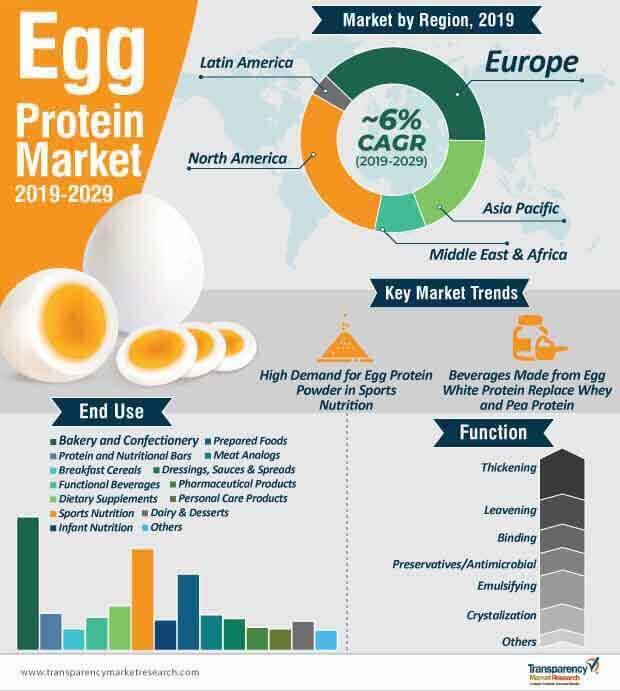
Innovations in Egg Protein Powder Boost Growth in Sports Nutrition Space
Manufacturers in the food & beverage industry are increasing the applications of egg protein in the bakery and sports nutrition sectors. Likewise, egg protein is gaining prominence in various protein powders to cater to the demands of consumers in the sports nutrition sector.
Revenue in the egg protein market from the sports nutrition sector is anticipated to be the highest, reaching a value of ~US$ 419.8 million by 2027. Due to the growing number of diet-conscious consumers, manufacturers in the egg protein market are developing egg white protein powders with interesting flavors such as chocolate, vanilla, and strawberry. Since flavored egg protein products are projected for high growth during the forecast period, companies are introducing egg protein powders that complement the paleo diet of these health-conscious consumers and athletes.
Request for Report Brochure @ https://www.transparencymarketresearch.com/sample/sample.php?flag=S&rep_id=50814
Egg protein powders are increasingly gaining consumer attention as they contribute to weight loss and increased muscle gain. Manufacturers in the egg protein market are developing improved egg white protein powders for consumers suffering from lactose intolerance. Thus, egg white protein powders cater to the on-the-go food preferences of consumers.

Microbial Fermentation a Cost-effective Option for Mass Production of Egg Protein
The fermentation process via modified yeast is emerging as a greener and cost-effective option for manufacturers in the egg protein market. Manufacturers are adopting the animal-free approach to manufacture egg protein products, which is otherwise an expensive affair using factory farming methods.
As consumers are opting for vegan diets, the commercialization of egg proteins delivers a complete vegan protein source, enhanced with the unique functionality of animal protein. As such, food giants are teaming up to develop egg protein using synthetic biology techniques in the egg protein market. For instance, in April 2019, Clara Foods – a San Francisco-based startup, announced its Series B financing with Ingredion – a leading global ingredients solution company, to manufacture and formulate animal-free egg proteins.
Request for Covid-19 Impact Analysis @ https://www.transparencymarketresearch.com/sample/sample.php?flag=covid19&rep_id=50814
Besides egg protein powders, manufacturers are commercializing egg protein to produce ready-to-drink beverages. They are also offering unique nutritional bars made with egg white protein.
Egg White Protein v/s Whey Protein: Which is Better?
Egg proteins are steadily replacing plant-based proteins such as whey, soy, and pea proteins. Since egg proteins offer high protein content and no fat in just two-three servings, vegetarian consumers in the egg protein landscape are demanding novel egg protein products.
Likewise, manufacturers are offering protein beverages that are a mixture of egg white and chocolate milk. Whey protein is dominant in supplements and powders, as it is easy to produce and can be easily flavored as compared to egg proteins. However, whey contains lactose, which does not agree with consumers who are lactose intolerant. Lactose also leads to digestive problems in many individuals, which aggravates complications such as diarrhea and extreme cramps.
For More Info View @ https://www.transparencymarketresearch.com/casestudies/food-and-beverages-case-study
Manufacturers in the egg protein market are producing nutritional bars with egg white proteins, as these proteins are easy to absorb as compared to plant-based proteins. This phenomenon has given rise to the concept of ‘bioavailability’. Thus, consumers are opting for egg protein snacks with higher bioavailability to achieve greater muscle recovery, which also gives them the satisfaction of a fuller meal.





